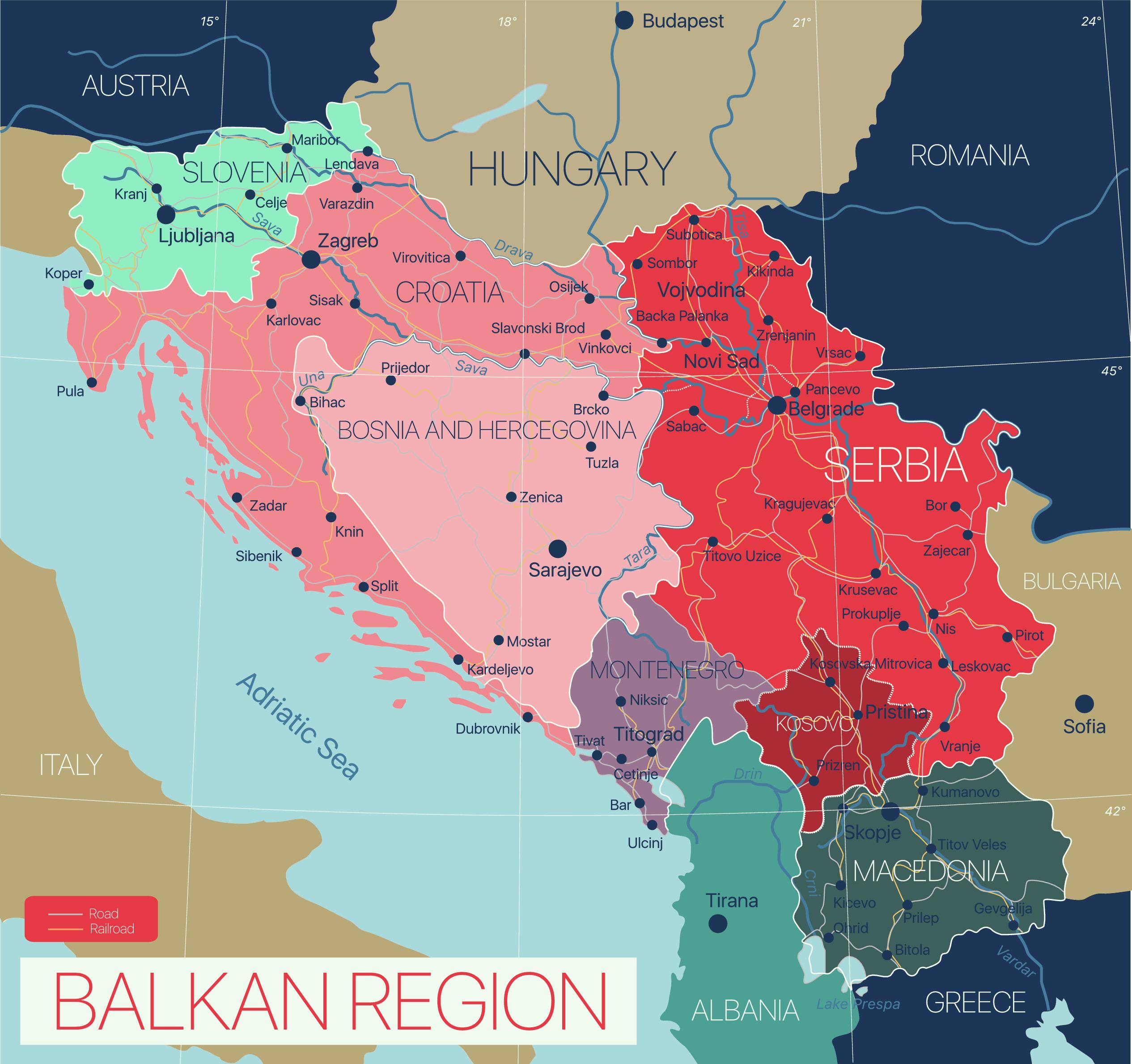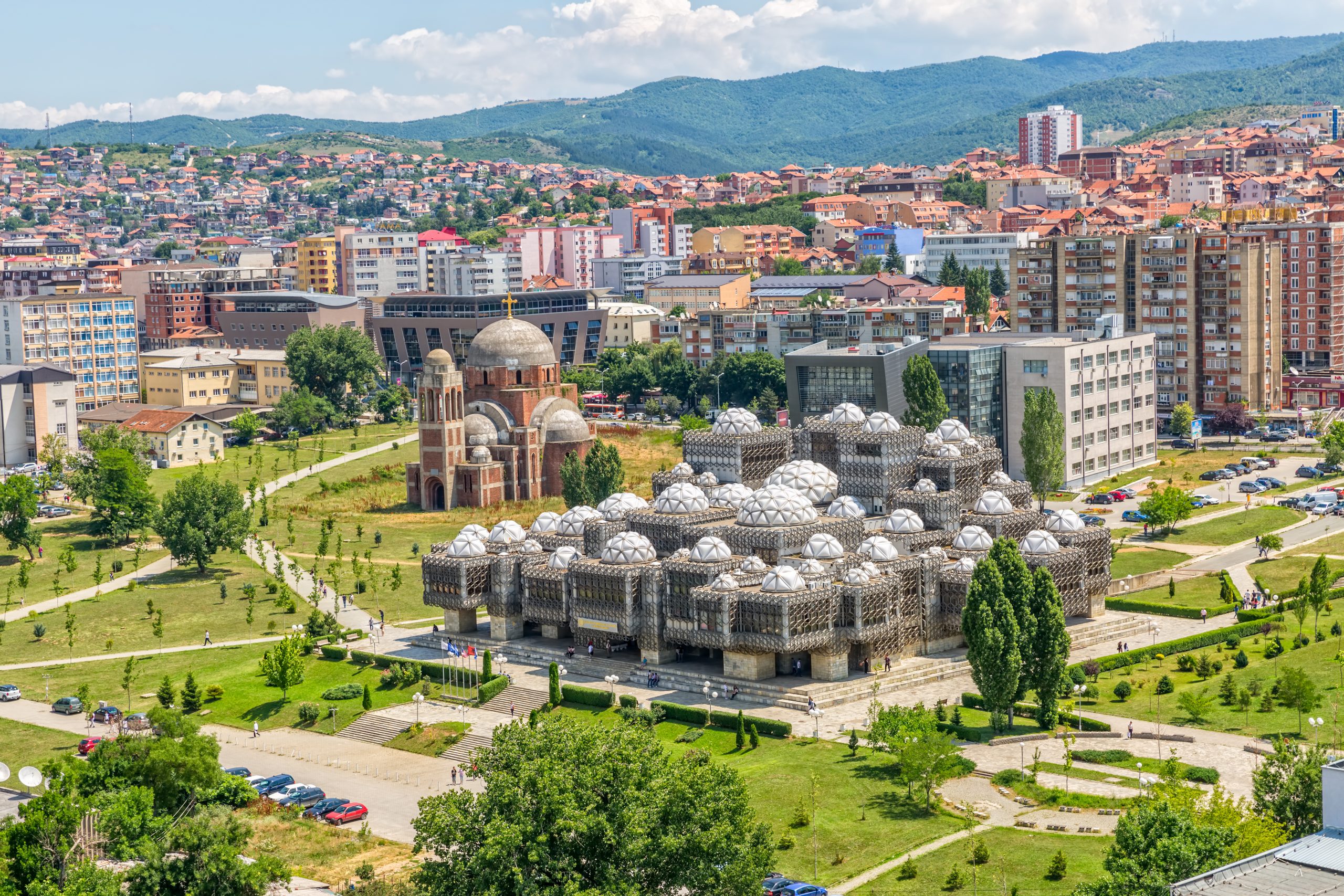Strategic Analysis Balkan Brief
Bi-weekly review (24.5. – 11.6.2021)
Ivan Iliev

Map of the Balkan region; Graphics: Olinchuk/Shutterstock
Albania
Albania Parliament’s step raises concerns about Media Board’s credibility
On May 24, information that the Albanian parliament opened positions in the Audio-visual Media Authority board was announced. Regarding the importance of this board concerning media freedom, the step is raising concerns about building a one-sided body that would support the currently ruling Socialist Party.
Mainly, the politicians from the opposition parties and Albanian-based NGOs have expressed criticism that the current parliament should have waited with the new parliament members who were elected in April’s elections. The first session of the newly elected MP’s is scheduled for September, after the summer pause. Yet, the new nominees will probably occupy currently accessible seats until by then.
The current parliamentary opposition is concerned that the Socialist Party nominees and supporters will ultimately occupy the institution, leaving no space for different opinions to be heard on the board. The head of the Albania Media Council said that the step resembles a power grab by the Socialists and that this could damage the credibility of the board.
According to Albanian law, the board should be politically independent. However, the reality might be colliding with laws. Numerous observers and political experts claim that the board members will be representatives of the political parties by which they are proposed into the board.
Sources:
- Erebara Gjergj, Balkan Insight, „Albania Parliament’s Race to Fill Media Board Causes Alarm“, https://balkaninsight.com/2021/05/24/socialists-hurry-to-elect-media-board-alarm-experts/
- Taylor Alice, Exit News, „Government Races to Fill Vacancies on Albanian Media Authority Board“ https://exit.al/en/2021/05/25/government-race-to-fill-vacancies-on-board-that-could-decide-fate-of-albanian-online-media-portals/
Bosnia and Herzegovina
Bosnian Serbs Set Price For Accepting the New High Representative
Christian Schmidt from Germany gets ready to replace Austria’s diplomat Valentin Inzko as the Head of the Office of the High Representative for Bosnia and Herzegovina (OHR) this August. Regarding the change, the Serbian entity Republika Srpska has expressed terms for Schmidt’s recognition.
Milorad Dodik, who has continuously called for closing the OHR, has claimed a negative opinion about the new official. Serbian member of the three-member state presidency has expressed that Republika Srpska will accept a new High Representative if appointed following Annex 10 of the 1995 Dayton Peace Agreement. Also, Russia, the firm ally of Republika Srpska, did not support a step to select Schmidt in the vital position. That makes Dodik and his followers more confident in setting the terms for Schmidt’s recognition. Schmidt’s new role is highly supported in Germany, which makes place for robust international support, and that might be why Dodik is afraid and acting against him.
Concerning the leaving High Representative, the leadership of Bosnia and Herzegovina and media in the country evaluate Indzko’s performance as weak in imposing solutions. Therefore, as media in the country already inform, the new High Representative Schmidt will have to engage more strongly with the citizens and institutions.
The High Representative for Bosnia and Herzegovina position was established by the Dayton Peace Agreement in 1995 to overlook and control the situation in ethnically divided Bosnia and Herzegovina after the bloodshed in the 1990s.
Sources:
- Kovacevic Danijel, Balkan Insight, „Bosnian Serbs State Price For Accepting New High Representative“, https://balkaninsight.com/2021/05/27/bosnian-serbs-state-price-for-accepting-new-high-representative/
- Mujanovic Jasmin, Balkan Insight, „Bosnia´s EUFOR Mission Endangered by Russia-West Row over New Overseer, https://balkaninsight.com/2021/06/01/bosnias-eufor-mission-endangered-by-russia-west-row-over-new-overseer/
Croatia
To upgrade the airforce, Croatia has chosen French Fighter Jets
Croatia has decided to strengthen the airforce with 12 used Dassault Rafale F3R jets from France. Croatian Prime Minister Andrej Plenkovic announced it at the end of May. It is considered a significant step to modernize the Croatian airforce.
Plenkovic commented the purchase as advantageous – for the least money, Croatia buys the best-rated and equipped planes. Croatia expects to receive the jets in early 2024. Plenkovic claimed that the price of 999 million euros includes planes, equipment, and several Croatian pilots who will have the opportunity to train in France for a couple of years.
The latest purchase is the most significant investment of the Croatian Armed Forces. In the tender, French jets were competing with a new US F-16 Block 70, a new Swedish JAS-39 Gripen, and a used Israeli F-16 Barak.
Plenkovic announced the step as Croatia was marking Armed Forces Day and the 30th anniversary of the formation of its armed forces, which had become a stable NATO partner since 2009 when Croatia joined the Treaty. This is the second time Croatia has tried to procure fighter jets. The first attempted purchase of twelve F-16s from Israel collapsed in 2019 when the media blamed US interference in the process.
Sources:
- France24, „Croatia to buy 12 used Rafale fighter jets from France for €1 billion“ https://www.france24.com/en/europe/20210528-croatia-to-buy-12-used-rafale-fighter-jets-rom-france-for-%E2%82%AC1-billion
- Vladisavljevic Anja, Balkan Insight, „Croatia Selects French Fighter Jets to Upgrade Airforce“, https://balkaninsight.com/2021/05/28/croatia-selects-french-fighter-jets-to-upgrade-airforce/
Kosovo
EU and US will seek the revival of the Kosovo-Serbia Dialogue
Brussels and Washington want to launch an effort to renew the Kosovo-Serbia dialogue. The European Union and United States envoys for the EU-mediated dialogue met Kosovo leaders in Pristina on May 31 to display a joint effort to resolve the dispute between the two countries.
Their visit occurred before the meeting between Kosovo and Serbia’s leaders planned for mid-June. The US envoy Palmer stressed that his country has many questions about the quality of cooperation between the EU and the US in the Balkans and said that the US supports the dialogue between Kosovo and Serbia. The EU Envoy Lajcak reacted that the best demonstration of the EU-US cooperation is that Matthew Palmer is in Kosovo. Palmer also added that neither US nor the EU is fully responsible for the outcomes of the reconciliation effort, but Serbia and Kosovo are the decisive elements. Palmer reminded that the US continue to support mutual recognition of both countries to resolve the dispute.
In the light of the visit, the Kosovo Democratic Institute – a Pristina-based think tank-has expressed that the Kosovo parliament should be more involved in the dialogue and asked prime minister Kurti for transparency during the process.
The visit of top US and EU diplomatic representatives occurred just in time, as opposition leaders in Kosovo requested the US to become more involved in the process. Many Kosovo figures welcomed the visit, claiming that it could get a new dynamics by the US engaged in the process.
Sources:
- Associated Press, „Top US, EU envoys visit Kosovo to promote talks with Serbia“, https://apnews.com/article/kosovo-europe-serbia-government-and-politics-3309949876cba432993873d7c29e384a
- Isufi Perparim, „EU, US Push for ‘New Dynamics’ in Kosovo-Serbia Dialogue“, https://balkaninsight.com/2021/06/01/eu-us-push-for-new-dynamics-in-kosovo-serbia-dialogue/

Prishtina, Kosovo. Photo: OPIS/ Shutterstock.com
Montenegro
Council of Europe warns about Growing Ethnic Division in Montenegro
The Council of Europe (CoE) has warned that the division between ethnic communities is deepening in Montenegro. In this regard, the CoE has also stressed the importance of improving the monitoring of hate speech in the country. Even though hate speech is criminalized in Montenegro, the country lacks the authority to monitor social media as no agency has the mandate to do so.
The problem in the country has been continuing, as even the progress report of the European Commission from 2020 warned that hate speech and verbal abuse in the media and social networks have worsened in Montenegro. The report proposed to increase the judicial system’s capacity to address hate speech and clarify which cases will be punished and which not. However, tangible results are not visible. Today, ethnic minorities are not forbidden to display their national symbols in Montenegro. However, they must simultaneously display the Montenegrin flag or face fines.
Montenegro is a multi-ethnic country, where one community makes up nearly half of the population. The most significant part being Montenegrins (45%), followed by Serbs (29%), Bosniaks and Muslims (11%) and Albanians (5%).
Sources:
-
Kajosevic Samir, Balkan Insight, „Council of Europe Fears Growing Ethnic Divide in Montenegro“, https://balkaninsight.com/2021/06/07/council-of-europe-fears-growing-ethnic-divide-in-montenegro/
North Macedonia
Germany hopes to see a breakthrough in the integration process of North Macedonia
During the latest visit to Skopje in late May 2021, Germany’s Minister for Europe, Michael Roth, said that there is a chance of a breakthrough in Bulgaria – North Macedonia relations. He claimed that this time, it would allow the start of North Macedonia’s delayed EU accession talks on June 22 in the EU Council.
Roth talked about the issue after the meeting with North Macedonia’s European Affairs Minister, Nikola Dimitrov. Roth also stressed that North Macedonia needs credible successes in the Western Balkans – not because it is in the country’s interest, but because it is also in the EU´s interest to create a stable, safe and democratic North Macedonia.
Bulgaria blocked the start of North Macedonia’s EU accession talks last year. It happened due to disputes over North Macedonian history, language and identity. Bulgaria insists all of them have Bulgarian roots, while North Macedonian officials deny these claims. Even though Bulgaria and North Macedonia have expressed interest in continuing talks, the government in Skopje is careful – so that the development of relations would not compromise issues such as national identity.
Sources:
- European Western Balkans, „Roth: The facts on Albania and North Macedonia indicate that negotiations must begin“, https://europeanwesternbalkans.com/2021/05/28/roth-the-facts-on-albania-and-north-macedonia-indicate-that-negotiations-must-begin/ň
- Marusic Sinisa Jakov, Balkan Insight, „Germany Rekindles Hope of Breakthrough on North Macedonia’s EU Bid“, https://balkaninsight.com/2021/05/27/germany-rekindles-hope-of-breakthrough-on-north-macedonias-eu-bid/
Serbia
The new mayor of Preševo warns about Belgrade´s actions
Ardita Sinani, the newly elected mayor of Preševo, an ethnic Albanian majority municipality in south Serbia, claims that Belgrade is committing silent ethnic cleansing in the municipality by deleting the addresses of citizens.
Sinani has claimed so at the end of May, in an interview, just two weeks after taking office in reaction to Belgrade´s action in which Serbia authorities deleted numerous addresses of Albanians from Preševo and two other municipalities.
The complaints have also been received in Brussels, but the EU requires more time to clarify data and information. However, Sinani is sure that Belgrade is committing ethnic cleansing by stealth. In March, The European Parliament has already agreed to amend the EU report on Serbia and investigate claims about ethnic cleansing.
Even the Standing Rapporteur for Serbia, Vladimir Bilcik, and his Kosovo counterpart, Viola von Cramon-Taubadel, said the EU would take a closer look into the allegations. As the EU-facilitated dialogue between Kosovo and Serbia is expected to continue in June, Sinani claims that the mentioned issue must be one of the topics of the upcoming dialogue.
Sources:
- European Western Balkans, „Roth: The facts on Albania and North Macedonia indicate that negotiations must begin“, https://europeanwesternbalkans.com/2021/05/28/roth-the-facts-on-albania-and-north-macedonia-indicate-that-negotiations-must-begin/ň
- Marusic Sinisa Jakov, Balkan Insight, „Germany Rekindles Hope of Breakthrough on North Macedonia’s EU Bid“, https://balkaninsight.com/2021/05/27/germany-rekindles-hope-of-breakthrough-on-north-macedonias-eu-bid/

Contact us